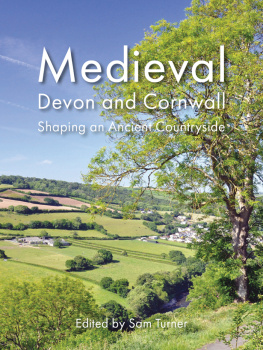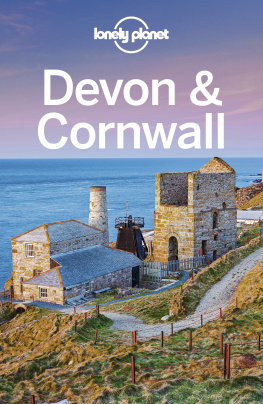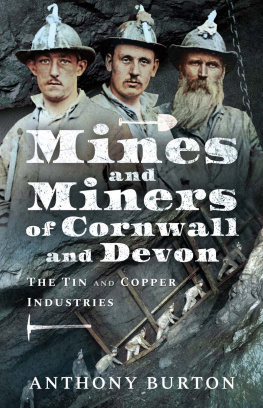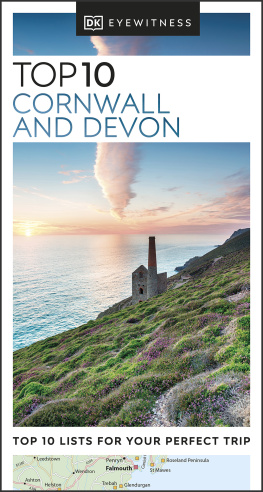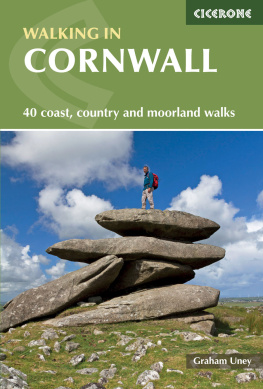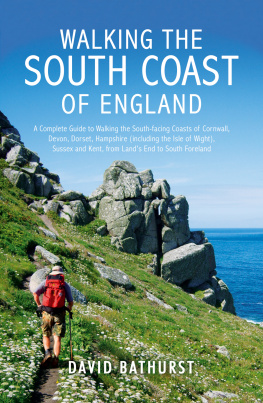Turner Sam - Medieval Devon and Cornwall
Here you can read online Turner Sam - Medieval Devon and Cornwall full text of the book (entire story) in english for free. Download pdf and epub, get meaning, cover and reviews about this ebook. year: 2017, publisher: Windgather Press, genre: Romance novel. Description of the work, (preface) as well as reviews are available. Best literature library LitArk.com created for fans of good reading and offers a wide selection of genres:
Romance novel
Science fiction
Adventure
Detective
Science
History
Home and family
Prose
Art
Politics
Computer
Non-fiction
Religion
Business
Children
Humor
Choose a favorite category and find really read worthwhile books. Enjoy immersion in the world of imagination, feel the emotions of the characters or learn something new for yourself, make an fascinating discovery.
- Book:Medieval Devon and Cornwall
- Author:
- Publisher:Windgather Press
- Genre:
- Year:2017
- Rating:5 / 5
- Favourites:Add to favourites
- Your mark:
- 100
- 1
- 2
- 3
- 4
- 5
Medieval Devon and Cornwall: summary, description and annotation
We offer to read an annotation, description, summary or preface (depends on what the author of the book "Medieval Devon and Cornwall" wrote himself). If you haven't found the necessary information about the book — write in the comments, we will try to find it.
Medieval Devon and Cornwall — read online for free the complete book (whole text) full work
Below is the text of the book, divided by pages. System saving the place of the last page read, allows you to conveniently read the book "Medieval Devon and Cornwall" online for free, without having to search again every time where you left off. Put a bookmark, and you can go to the page where you finished reading at any time.
Font size:
Interval:
Bookmark:

MEDIEVAL DEVON AND CORNWALL
Shaping an Ancient Countryside
Edited by Sam Turner

Windgather Press is an imprint of Oxbow Books
Published in the United Kingdom in 2006
Reprinted in 2017 by
OXBOW BOOKS
The Old Music Hall, 106108 Cowley Road, Oxford OX4 1JE
and in the United States by
OXBOW BOOKS
1950 Lawrence Road, Havertown, PA 19083
Windgather Press 2006
Paperback Edition: ISBN 978-1-90511-907-3
Digital Edition: ISBN 978-1-91118-827-8
Mobi Edition: ISBN 978-1-91118-828-5
A CIP record for this book is available from the British Library
All rights reserved. No part of this book may be reproduced or transmitted in any form or by any means, electronic or mechanical including photocopying, recording or by any information storage and retrieval system, without permission from the publisher in writing.
For a complete list of Windgather titles, please contact:
| UNITED KINGDOM | UNITED STATES OF AMERICA |
| Oxbow Books | Oxbow Books |
| Telephone (01865) 241249, Fax (01865) 794449 | Telephone (800) 791-9354, Fax (610) 853-9146 |
| Email: | Email: |
| www.oxbowbooks.com | www.casemateacademic.com/oxbow |
Oxbow Books is part of the Casemate Group
Front cover image: Castle Hill view, Torrington, Devon ( Shutterstock.com ).
Many people have helped in the production of this book. The editor is grateful to Oscar Aldred, Peter Child, Anne Dick, Harold Fox, Martin Gillard, Faye Glover, Frances Griffith, Debbie Griffiths, Peter Herring, Bill Horner, Anne Richards and Steve Rippon for many insights and discussions on the medieval landscape of south-west England. Sincere thanks are also due to the referees who read and commented on all the papers prior to publication. The editor owes most to the authors of each of the chapters, who all replied to queries and suggestions with great speed and good humour.
Bodmin Moor (Cornwall) in snow, looking south-east across the fields of Tresellern towards Trewortha Tor
Coombe, Lifton (Devon), looking south-east
Rough grazing on the north Cornish coast
The incorporation of pollen into peatland systems
The location of pollen sites within mid-Devon and Exmoor
Selected summary pollen diagrams from the mid-Devon lowland to Exmoor upland transect
The relationship between the pollen sites in mid-Devon around Rackenford and the historic landscape
The later medieval field system and settlement pattern on Molland Common, southern Exmoor
The inscribed stone at St Samsons, South Hill (Cornwall).
Tintagel Island, viewed from Glebe Cliff below St Matherianas church (Cornwall)
Early medieval settlements around the probable early monastery of St Keverne (Cornwall)
The cross-shaft fragments at Dolton (Devon)
King Donierts Stone and the Other Half Stone, St Cleer (Cornwall)
A medieval wayside cross: Long Tom, St Cleer (Cornwall)
Fourhole Cross, St Neot (Cornwall)
The inscribed stone at Cardinham
The Cardinham Cross (Cornwall)
Wydeyeat Cross, Cardinham (Cornwall)
A simplified representation of the later medieval Cornish landscape as derived from the 1994 Historic Landscape Characterisation
A typical area of Anciently Enclosed Land in Lanreath parish
Surviving enclosed strip-field patterns in Cornwall and Devon
Zennor churchtown
Extract from the 1841 Tithe Apportionment Map for Zennor parish showing the ribbon shaped townland of Treen
Metherell in Calstock manor and parish as mapped in the 1880s
Kilkhampton, an early fourteenth-century town
The surviving unenclosed strip field system on Forrabury Common
Extract from the 1839 Blisland parish Tithe Apportionment Map
Extract from the 1840 Altarnun parish Tithe Apportionment Map
Extract from the 1841 Advent parish Tithe Apportionment Map
Godolphin in Breage as mapped in the later nineteenth century
Trevarrian in St Mawgan, in Pydar parish
Marsland and Cory in Morwenstow parish
A reconstruction of Lanhydrock churchtown and fields in the fifteenth century
Brick-shaped later prehistoric fields at Bosigran in Zennor 72
Brown Willy from the south-west
The western fields of Brown Willy in the mid thirteenth century and around 1800
A reconstruction of the mid thirteenth-century hamlet at Brown Willy
Typical stony bank separating medieval strips in the NE Field of Brown Willy
The full extent of the medieval longhouse hamlet at Brown Willy
The medieval field system on Garrow Tor
A portion of the medieval NE Field at Brown Willy showing narrow ridge and furrow or lazy-beds
Lazy-beds within medieval strip fields at Trezibbett, Altarnun
Brown Willy townland
Pasture boundaries on the eastern side of Brown Willy
Medieval herds shelter, in the form of a beehive hut, on the eastern side of Brown Willy
Distribution map of castles and other medieval fortified sites in Devon and Cornwall
Bushy Knap and Buckerell Knap
Holwell Castle, Parracombe
Okehampton Castle
Restormel Castle, showing the parapet walk of the thirteenth-century shell-keep
Restormel Castle, showing the level terrace around the shell-keep
Lydford, showing the tower of the castle/prison apparently surmounting a motte
Launceston, showing the donjon with its famous triple-tiered appearance
The location of Dartmoor
Simplified earthwork survey of Beckamoor Combe tin streamwork (northern section)
Simplified map of the upper Plym valley showing the extent of streamworks and pitworks within the watershed
Oblique aerial photograph of streamworks along the River Swincombe near Fox Tor
The central upland of southern Dartmoor showing the extent of tinworking on the major rivers and their tributaries
Simplified map based on RCHME/EH survey of the Birch Tor area
Part of the RCHME/EH 1:2500 earthwork survey of Birch Tor showing the complexity of the site
Oblique aerial photograph of the Birch Tor area
Map of part of Whitchurch Common showing Barn Hill and the southern half of Beckamoor Combe streamwork (i.e. south of the B3357)
The Pixies Revenge by K.Hablot Browne
Early medieval souterrain at Rathkeel (Co. Antrim)
The Norman font in St Marys Church, Luppitt (Devon)
Excerpt from the nineteenth-century Tithe Survey showing the existence of folkloric elements in the placenames at Gatehouse, Dawlish (Devon)
Looking south across the Blackdown Hills to Dumpdon Hillfort (Devon)
For Maggsie and Mondo
a souvenir
It gives me great pleasure to welcome this book because it reports on so many recent advances in interpretations of the landscape history of Devon and Cornwall. I began research into this subject in an intellectual tradition which had been laid down in a few formative years between 1952 and 1954. It is worthwhile to look back upon that advance, to ask how well the ideas which it contained have fared and to mention a little of the new work undertaken since the 1950s, culminating in this book.
In 1954 W.G.V.Balchin published his Cornwall: An Illustrated Essay on the History of the Landscape , part of a series edited by W.G.Hoskins. Balchin acknowledged that between the fifth century and the eleventh some developments took place in the Cornish landscape, in the darkness of this period, but considered that they had only a small impact. Then comes the remarkable statement that, in 1086, Cornwall ... had fewer than 20,000 people all told fewer than either Penzance or St Austell today. It followed from this that much in the landscape was thought to be later: between the twelfth and fourteenth centuries a remarkable number of new farms came into existence, as in Devon (Balchin 1954, 3440). Two years earlier Hoskins had published his long, magisterial essay on The making of the agrarian landscape of Devon, arguing that approximately 12,500 new farms were created between 1086 and around 1350, and that the twelfth and thirteenth centuries were the most formative years in the making of the rural landscape (Hoskins 1952, 31621). He thus minimised the pre-Saxon contribution (though later he wisely changed his mind, as in Hoskins 1968, 6) and stressed a relatively brief episode after the Norman Conquest. When I began my research, the only available overviews were those of Hoskins and Balchin but I did not then have the competence to query them. They are still treasures of mine which I turn to frequently, and the period when I first read them is one to which I look back now with unclouded affection.
Next pageFont size:
Interval:
Bookmark:
Similar books «Medieval Devon and Cornwall»
Look at similar books to Medieval Devon and Cornwall. We have selected literature similar in name and meaning in the hope of providing readers with more options to find new, interesting, not yet read works.
Discussion, reviews of the book Medieval Devon and Cornwall and just readers' own opinions. Leave your comments, write what you think about the work, its meaning or the main characters. Specify what exactly you liked and what you didn't like, and why you think so.

